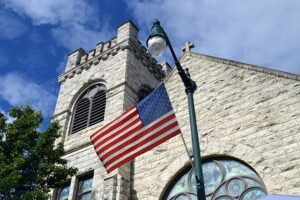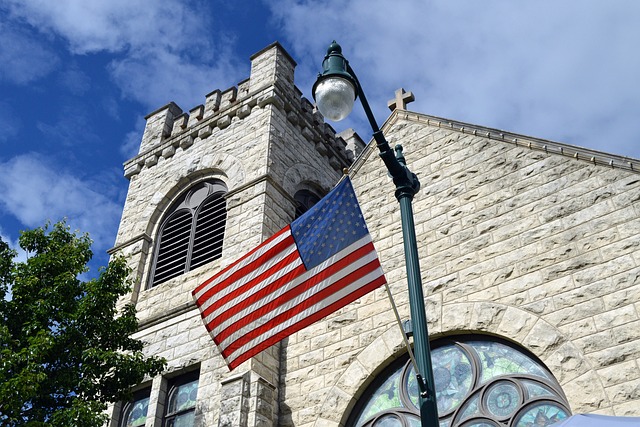
In The Religion of American Greatness, Paul Miller said his book was primarily an examination of the ideology of nationalism, particularly the kind of American nationalism that uses Christian symbols and rhetoric. He said nationalism has been increasing in its popularity around the world today. He said it is an “irresistible political tool” for leaders looking to stir up enthusiasm and support within their base. “Nationalism is almost always idolatrous in the sense of becoming a substitute religion.” When nationalism is given a Christian gloss, it conflicts with core American ideals of liberty and equality for all people and “amounts to the pursuit of Christian power at the expense of Christian ideals.”
Miller quoted Clifford Geertz’s definition of religion from Interpretation of Cultures and argued that nationalism fulfilled all the criteria of a religion. Geertz said religion was a system of symbols that acted to establish powerful, pervasive, and long-lasting moods by formulating conceptions of a general order of existence. These conceptions are clothed with such an aura of factuality that the “moods and motivations seem uniquely realistic.”
Nationalism fulfills all the criteria of a religion. It is a set of symbols that establishes powerful moods that last for centuries. It describes a general order for life, an orienting framework with a standard of right and wrong, a sense of purpose and direction. And it roots this general order in an “aura of factuality,” a story about the nation’s ancient roots and primal existence which seems feasible because the nation preexists us and outlives us.
However, Miller didn’t originate the idea of a secular or civil “religion.” Robert Bellah wrote about it in “Civil Religion in America in 1967. Bellah attributed the phrase “civil religion” to Rousseau in The Social Contract. He acknowledged the phrase was not used by America’s founding fathers, but similar ideas were “to be found among the Americans.” Bellah said:
While some have argued that Christianity is the national faith, and others that church and synagogue celebrate only the generalized religion of “the American Way of life,” few have realized that there actually exists alongside of and rather clearly differentiated from the churches an elaborate and well-institutionalized civil religion in America. This article argues not only that there is such a thing, but also that this religion—or perhaps better, this religious dimension—has its own seriousness and integrity and requires the same care in understanding that any other religion does.
Nationalists say they want to preserve their nation’s heritage. They want to honor the past, to preserve what came before. They claim nationalism simply means being patriotic, the love of country. However, Miller said the word can mean much more than mere patriotism. He agreed that the love of country is generally a good thing, but we need to be on our guard “against some common temptations to ensure our love is rightly ordered.”
Miller then turned to C.S. Lewis in his book, The Four Loves, where Lewis looked at the love of one’s country. He commented that we all now know that love of country can become a demon when it becomes a god. Seemingly, Lewis here made a reference to Nazi Germany during the Second World War. He said when this kind of love becomes demonic, it will produce wicked acts. Demonic patriotism when it exists within the citizens of a nation, makes it easier for its rulers to act wickedly; healthy patriotism may make it harder.
When they are wicked, they may by propaganda encourage a demonic condition of our sentiments in order to secure our acquiescence in their wickedness. If they are good, they could do the opposite. This is one reason why we private persons should keep a wary eye on the health or disease of our own love for our country.
Lewis seems to agree with Miller that nationalism can become a substitute religion. But when it does, it should not be called “Christian” in any sense of the term. He also said Christendom needed to make a full confession of the extent to which it contributed to the sum of human cruelty and treachery. Large areas of “the World” won’t listen to us until we have publicly disowned much of our past. “Why should they? We have shouted the name of Christ and enacted the service of Molech.”
Miller said nationalism is a totalistic political religion that is inconsistent with orthodox Christianity. It is “a false religion that places the nation in the place of the church and the leader in place of God.” He said the ideal type of Christian nationalism can’t fit with Christianity. “They are separate, rival, mutually exclusive religions.” Yes, Christians should be patriots, but true patriotism sometimes means rebuking your country for its sin; or even working against it, “as Bonhoeffer worked against the Nazi government of his German homeland.”
C.S. Lewis taught at Oxford throughout the Second World War and like others at the time, he reflected on ultimate issues such as life and death, good and evil, suffering and eternity, and the nature of reality. Among his writings of this time were “The Weight of Glory,” “Evil and God” and the initial series of talks on the BBC which later became part of his book Mere Christianity.
In his essay, “C. S. Lewis & Three Wars: 1941,” Joel Heck wrote there were some at the time who were advocating for the formulation of a Christian political party through letters to The Guardian, a British daily newspaper. In response to those letters, Lewis wrote “Meditation on the Third Commandment” for the January 10, 1941 edition of The Guardian. It is available in writing within God in the Dock. The title is a subtle allusion to the idolatry and consequences of which he wrote. The third commandment is: “You shall not take the name of the Lord your God in vain, for the Lord will not hold him guiltless who takes his name in vain.”
Lewis said, “Nothing is so earnestly to be wished as a real assault by Christianity on the politics of the world.” He pointed out there were some problems with forming a Christian party or a Christian platform in politics. First, Christians were not united on the means to accomplish their various ends. Some saw democracy as a monster (fascism), while others saw it as the only hope, with still others saw the need for a revolution (communism).
The three types represented by these three Christians presumably come together to form a Christian party. Either a deadlock ensues and there the history of the Christian party ends; or else one of the three succeeds in floating a party and driving the other two with their followers out of its ranks. The new party, being probably a minority of the Christians, who are themselves a minority of the citizens, will be too small to be effective. In practice, it will have to attach itself to the unchristian party nearest to it in beliefs about means . . . It remains to ask how the resulting situation will differ from that in which Christians find themselves today.
Whatever the party calls itself, it will not represent Christendom, but only a part of Christendom. “The principle which divides it from its brethren and unites it to its political allies will not be theological. It will have no authority to speak for Christianity. It will have no more power than the political its members give it to control the behavior of its unbelieving allies.” Lewis said there will be a real and disastrous novelty because it will not be simply a part of Christendom, but a part claiming to be the whole.
By the mere act of calling itself the ‘Christian party,’ it implicitly accuses all Christians who do not join it of apostasy and betrayal. It will be exposed in an aggravated degree to that temptation which the devil spares none of us at any time—the temptation of claiming for our favorite opinions that kind of degree of certainty and authority which really belongs only to our faith. The danger of mistaking our merely natural, though perhaps legitimate, enthusiasms for holy zeal, is always great. Can any more expedient be devised for increasing it than that of dubbing a small band of fascists, communists, or democrats the Christian party? The demon inherent in every party is at all time ready enough to disguise himself as the Holy Ghost. The formation of a Christian party means handing over to him the most efficient makeup we can find. And when once the disguise has succeeded, his commands will presently be taken to abrogate all moral laws and to justify whatever the unbelieving allies of the Christian party wish to do. If ever Christian men can be brought to think treachery and murder the lawful means of establishing the regime they desire, and fake trials, religious persecution and organized hooliganism, the lawful means of maintaining it, it will surely be by just such a process as this. The history of the late medieval pseudo-Crusaders, of the Covenanters, of the Orangemen, should be remembered. On those who add, “thus said the Lord” to their merely human utterances, descends the doom of a conscience, which seems clearer and clearer the more it is loaded with sin. All this come from pretending that God has spoken when He has not spoken.
C.S. Lewis thought that by natural light God has shown us which means are lawful. To discover which one is efficacious, “He has given us brains. The rest he has left to us.”
Miller concludes “The Religion of American Greatness” by saying churches must take a role in challenging Christian nationalism. He said there was no more credible voice to confront an unhealthy Christian political witness than the healthy kind. Jesus gave his church the authority to proclaim his message and represent his name (Matthew 28:18-20). And when his name and message are misrepresented, “the church must be at the forefront of saying so and correcting the record.”
For further reflections on nationalism, see the link “Christian Nationalism” on this website.





